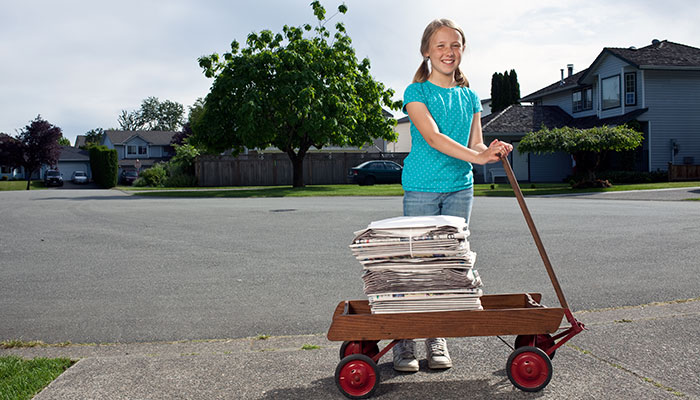As of this week, more than 100 community and regional newspapers across the country will no longer be printed, their final editions coming off the press last weekend.

Stop press: many communities around Australia are losing a service as basic as garbage collection as dozens of newspaper close this week, says Dr Willa McDonald.
In a Rupert Murdoch-owned News Corp restructure, 76 titles have become digital only, and another 36 mastheads have ceased publication all together.
While not as hard hit as Queensland, where only four daily newspapers remain in print and 20 titles are scrapped, in NSW four publications are lost and only three community titles – all of them serving affluent Sydney areas – will continue in print.
It followed the April suspension by Australian Community Media, publisher of 160 regional and rural newspapers previously owned by Fairfax, of the print editions of non-daily mastheads due to a sharp advertising downturn caused by the coronavirus pandemic.
It’s a bit like if you removed local councils and you no longer had anyone collecting the rubbish – it’s right at the basic level of how communities operate.
The federal government has responded to the crisis with a $50 million bailout package for regional publishers and broadcasters, with funds being released to 107 successful grant applicants from this week – on the proviso that suspended mastheads will resume printing.
But for the communities affected by the News Corp closures, such a move is too late.
“If communities are losing their newspapers all together I think that’s really problematic,” says Dr Willa McDonald, a Senior Lecturer in Media and member of the Centre for Media History at Macquarie University.

Hatches, matches, dispatches: local newspapers provide a record of everything from council news to significant events in the lives of their readers like births , deaths and marriages.
“Community newspapers are part of the glue that holds those communities together. They are the way that the community finds out what’s going on – from who’s getting married to what the local council is up to – and they often act as papers of record and history’s first draft, where information can be found that would otherwise be lost.
“It’s a bit like if you removed local councils and you no longer had anyone collecting the rubbish – it’s right at the basic level of how communities operate.”
Digital versions that 'don't touch the sides'
McDonald is uncertain if digital platforms can serve a community as well as their print versions have – many for well over a century until this week, when their content goes behind News Corp digital paywalls that will ultimately require a subscription of up to $30 a month to access.
“Whether these services will actually provide what they used to provide and whether people will actually access them, remains to be seen,” says McDonald.
“On the surface I don’t think it’s a bad thing to save trees and go digital, especially with the younger generations who are digital natives – on the surface, that seems fine, as long as the same material is covered.
- Airline industry in a tailspin: what's next for Australian aviation?
- Why daydreaming on the commute is crucial
“It’s the loss of service that’s the problem … so often, and we’ve seen it with some of the big papers as well, the digital versions don’t even touch the sides of what was once done in print.”
Community newspapers, McDonald says, have a real role to play in being a balance against corruption, incompetence and malpractice, both by local governments and businesses, and outside players such as developers coming in and not paying attention to community interests.
“Communities through history have gained a huge amount from the existence of local newspapers,” she says.
Bush voice more crucial than ever
As well as underpinning their communities, newspapers have always been a key conduit of information from the bush to the city, McDonald says, with metropolitan media customarily keeping a close eye on their country counterparts for potential stories to build upon.
“The voice of the bush is at risk of being marginalised, at a time when environmental issues are becoming more and more prominent and paramount,” McDonald says.

Not the same: it remains to be seen whether digital platforms can serve a community as well as their print versions have, says McDonald.
“We’ve had droughts and bush fires and things aren’t going to get better quickly, and we need to know what’s going on.
“The more we cut off that bush voice, we cut off that avenue of information from the bush to the city, and that’s a real tragedy.”
From community to corporate, and back again?
Dr McDonald is a former journalist who worked at publications including The Sydney Morning Herald, The Bulletin and The Times on Sunday.
Her current research projects include a cultural history of literary journalism in colonial Australia.
In those pre-Federation times, there was a proliferation of journalism across the country, McDonald says. Literacy levels were high and the work of establishing a national identity was in full swing.
“In the colonial era there were many, many hundreds of small magazines, satirical newspapers, reviews and journals that would start up all over the place, all around the rural areas, and while they couldn’t sustain themselves it was a really rich culture: between 1850 and 1900 was an apogee of print culture in Australia,” she says.
It will be interesting to see what fills the vacuum now. Sometimes out of lack, when the absence is properly felt, new things will come up.
It was a time of experimentation, McDonald says, and being a writer was a highly esteemed occupation to which people aspired.
“They were like priests and prophets; they had a different role then, and print was all we had; there was no TV or radio,” she says.
“It will be interesting to see what fills the vacuum now. Sometimes out of lack, when the absence is properly felt, new things will come up.
“It may actually engender a lot of locally done, probably digital, publications, where people just want to have a go themselves.”
- Please explain: what's behind the brawl over our borders?
- Talking the talk: new games help kids explore language
Indeed, new independent weekly newspapers have already begun appearing since the pandemic hit.
In Naracoorte, South Australia, The News broke even after its first month in print, the ABC reported in June. In southern NSW, a group of local women launched The Yass Valley Times, and Bowral-based King Media did the same, launching the Southern Highlands Express.
“Journalism has always been with us, from the time one person decided to tell other people about what they thought was going on,” McDonald says.
“That will never die because we need it and it is a natural function of being human – to be curious, to be storytellers, to find out what’s going on and to tell people.”
Dr Willa McDonald is a Senior Lecturer in the Department of Media, Music, Communication and Cultural Studies.



